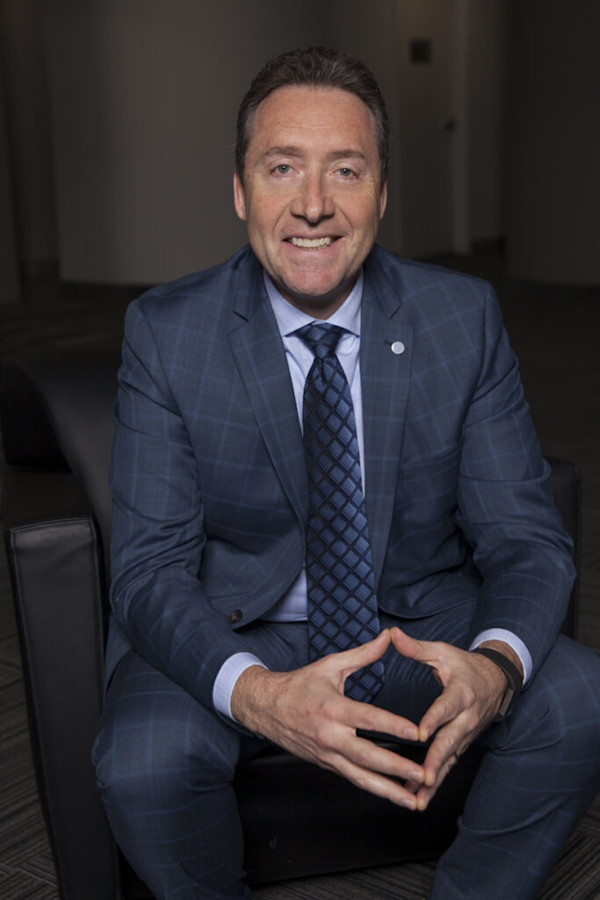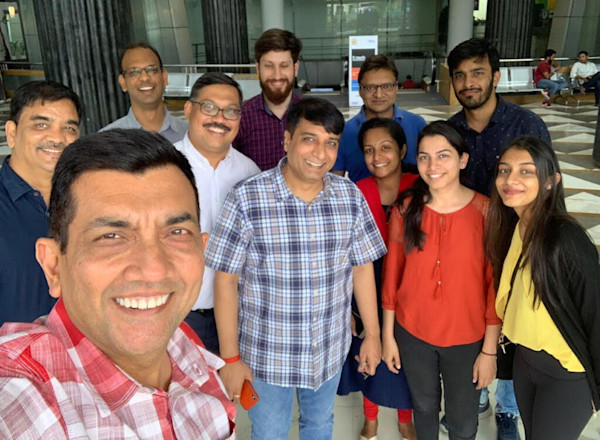The Recipe for AI leadership? Waterloo Region Has The Right Ingredients
Though Waterloo Region is currently ranked second in Canada for its AI ecosystem in terms of research and 11th in the world for AI impact, the industry didn’t become a regional specialty overnight.

A recipe is a deceptively complex thing.
More than a mere list of steps, it captures the kitchen tools you’ll need to make a dish, specific ingredients and quantities, preparation instructions with precise temperatures and techniques, and directions for plating and serving, all logically written in a way that’s easy to understand and follow.
It’s also cultural. Aubergine or eggplant? Rocket or arugula? Cilantro or coriander? It depends on where you live. Preparation methods differ too – to make a bowl of rice, you might grab the rice cooker, a pressure cooker, a pot or a pan. Even the ingredients depend on what’s available locally, or in-season.
Then there are the personal touches. Crank up the spice, or scale it back. A little sweeter here, a little saltier there. Substitute ingredients for a specific diet or an allergy.
A lot goes into that seemingly simple system. “Being able to understand all of that? That’s where AI comes in,” says Bahubali Shete.
Shete is co-founder and CEO of KloveChef, an AI-driven interactive cooking and recipe-sharing platform that he describes as “Google Maps in the kitchen” for the way it helps plan meals, buy food and cook – all enabled by voice and smart speaker technology.
And, as a recent grad of the Accelerator Centre’s Voice Technology Accelerator Program, which recently announced its second cohort, he says Waterloo Region has all the ingredients he needs to build out his platform internationally.
“I did my homework, and this is the best AI pool available in this part of the world.”
Creating a recipe for AI success
Though Waterloo Region is currently ranked second in Canada for its AI ecosystem in terms of research and 11th in the world for AI impact, the industry didn’t become a regional specialty overnight.

“It got started through partnerships between the private sector and the university,” he says.
Companies like OpenText were already in the area driving software development, while students from the University of Waterloo, specialized in areas like data science and analytics, cognitive computing, natural language processing, machine learning, deep learning and human-machine interfacing, began commercializing projects of their own.
Some of those projects grew exponentially. Miovision was an early example, says LaMantia of the AC grad and smart city scale-up that uses image recognition and AI analytics to identify traffic patterns and solve transportation problems in cities around the globe.
Other companies like Faire, which uses AI to help local retailers stock their shelves with products guaranteed to sell, and AC alumni Applyboard, which connects students and universities through an AI-powered application platform, reached unicorn status over the past year. Google and Shopify, too, drew talent and interest into the region, LaMantia notes.
“There are more than 100 companies currently working on AI-related applications. You could point to each of them and say, ‘Wow, that’s been very, very successful,’” he says.
While those companies grew, so did the research. At the University of Waterloo, you’ll find the Artificial Intelligence Group, the Natural Language Processing Lab, the Vision and Image Processing Lab, the Autonomous Vehicle Research and Intelligence Lab, the Intelligent Systems Engineering Lab and the Mechatronic Vehicle Systems Lab, to name a few.
“It’s always better to be a player, not a spectator. If you’re not driving that, you get left behind.”
Then there’s the support of civic leadership. The downtown core in Kitchener – one of the communities in Waterloo Region – is now home to Google and Communitech, along with homegrown startup and scaleup businesses. “A lot of people don’t know there was a conscious decision to direct and help that come to life … There was a very large bet placed by the city involved, with the Region of Waterloo’s support as well,” he adds.
“So it’s like a virtuous cycle. We throw that knowledge, we throw that technology at problems, and we learn by doing.”
Harnessing voice tech, the Waterloo Way
That learning-by-doing, real-world solution approach is something LaMantia calls “the Waterloo Way.”
Where other AI hubs focus on the theoretical, Waterloo Region stands out as an applied AI hub that tackles real-world problems, he says. “You can see it aligning with the areas where we’re strong. AI in tech, in manufacturing, in machine learning for supply chain development, and even in fintech.”
Voice tech is another application where the region is growing, says Clinton Ball, director of the first voice tech accelerator program in Canada to be done in collaboration with Amazon’s Alexa Fund. “The way we interact with consumer devices, the way we interact in business settings, the way we use these devices day to day… we’re not just limited to text anymore,” Ball says.
In their inaugural Voice Technology Accelerator Program cohort, which concluded at the end of June, the Accelerator Centre accepted a range of applicants, from early-stage businesses proving a market problem to later-stage companies interested in scaling up their operations.
In keeping with “The Waterloo Way,” that included companies looking to make a measurable and direct impact on a real-world challenge. “In this last cohort, we saw a lot of medical-specific applications of voice technology to help enable people to have better lives, the way that patients and caregivers interact, the way that the elderly receive medication,” he says. “All of these different applications have a very strong positive impact through voice technology.”
“The way we interact with consumer devices, the way we interact in business settings, the way we use these devices day to day… we’re not just limited to text anymore.”
But hey were also interested in applications that would change the way consumers use the technology altogether – companies like KloveChef, for example.
“AI as a vertical is something that spans lots of different industries, so when we see entrepreneurs that have artificial intelligence applications, deep learning applications, anything with machine learning, we look at the innovation value of that, and we want to help commercialize these ideas,” he says.
From a cup of coffee to an AI-powered platform
KloveChef started with a simple cup of coffee at Shete’s home in India.
“Every morning, [my wife and I] have our coffee together,” he says. “As part of that, you need to boil the milk. She would say, will you watch the milk? I would say yes, then get immersed in my newspaper. Invariably, that milk always spilled over.”
So his wife posed the challenge: “You’re a technology guy, and you understand cooking. Why don’t you do something to help consumers in the kitchen?”

It took multiple focus group discussions to whittle down the idea, and one in particular to hit the nail on the head. One of his older participants noticed that her husband, once hesitant to drive in their own city, was now a confident driver no matter the car or location thanks to Google Maps. “I wish there was a technology like that, where anybody can walk into any kitchen and cook any dish they like,” Shete remembers her saying.
Shete, a serial entrepreneur, had founded companies in robotics and IoT before. Voice tech, though, was something new. He accepted that challenge.
He quickly outgrew the market in India – which prompted him to open offices in North America. Today, with offices in Bangalore, New York City and Waterloo, they offer a platform that uses voice to find recipes, add items to a grocery list and talk through cooking directions. They have more than 670,000 users who have planned more than 2 million meals, cooked more than 70,000 meals and added almost 10,000 items to their shopping lists. They’ve even partnered with Chef Sanjeev Kapoor – “The Gordon Ramsay of India,” Shete says.
“I’ve seen multiple accelerators, multiple incubators, multiple mentors. But the kind of mentors the Accelerator Centre has, I will tell you, they are the best I’ve come across.”
Choosing Waterloo Region was an easy decision with the support available to startup companies. Talent and livability, in particular, were big draws for Shete. “For good AI talent and at the same time managing a constrained budget, I think this is the best place. That’s the reason I’m here,” he says.
As an AC client, he also notes the quality of the mentorship he’s received. “I’ve seen multiple accelerators, multiple incubators, multiple mentors. But the kind of mentors the Accelerator Centre has, I will tell you, they are the best I’ve come across,” he says. “Even for somebody who is so experienced, they were very valuable in helping me fine-tune my business, fine-tune my strategies, fine-tune my plan.”
And it’s only just beginning
Shete has a few secret ingredients to introduce in the future. Not only is he hiring key roles on his team and wrapping up a US$1 million seed funding round in his mission to continue improving the experience of cooking while reducing the amount of unused food that ends up in the bin, but he also wants to make recipe uploads as easy as dictating them to a smart speaker and make video recipes controllable by voice.
“What we have done is only the tip of the iceberg. We have a lot to do in terms of AI,” he says.
So does the region as a whole, says LaMantia. “If we’re serious about being resilient and we’re serious about inventing the future, it’s always better to be a player, not a spectator. If you’re not driving that, you get left behind.”
What’s the recipe for a successful future in AI in Waterloo Region? It comes down to the deployment of AI to solve social challenges and more unicorns.
Even with COVID-19, LaMantia notes a shift in AI businesses helping to create PPE, provide contact tracing and perform rapid testing. Add in the AC’s Voice Technology Accelerator Program, which is looking for innovative ventures in areas like smart homes, entertainment and media, witness and wellness, consumer and enterprise devices and more in their next cohort, and they’re well on their way.
In short: “With this disruption comes great opportunity,” says LaMantia. “I think we’re very well-positioned to play an active role in that.”
--
Ready to join the ranks of amazing AI and Voice Tech entrepreneurs and innovate “The Waterloo Way?”
Applications for cohort 2 the Accelerator Centre’s Voice Technology Program are open until October 18, 2020, and applications for The Accelerator Program are always open.
A Draft Canada Original